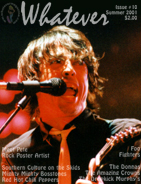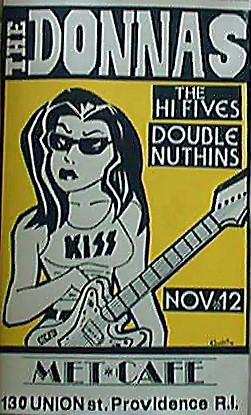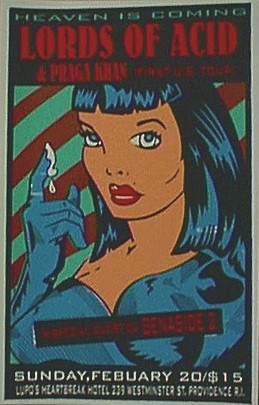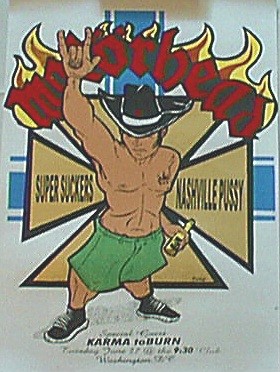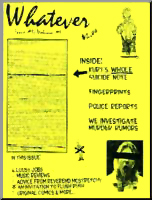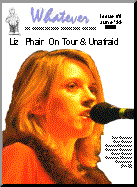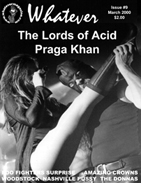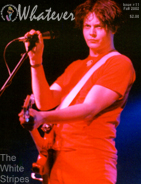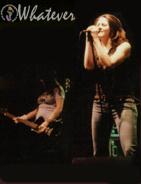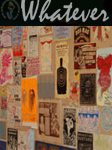A Talk With Providence's Punk Concert Poster Pro, Pete Cardoso, June 18, 2000
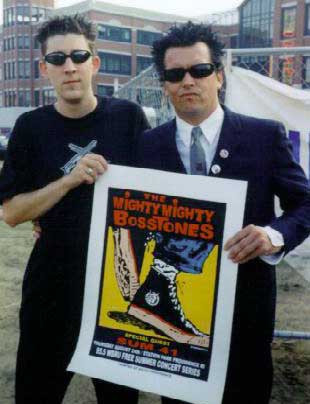 Pete [left] with Dickie from the Mighty Mighty Bosstones |
WM: Pete, how'd you get started doing concert posters? Pete: I guess in High School I started out doing flyers for the Strand, which was a lot of fun. I always liked live music and I started going to a lot of shows, and you know if you pass out flyers you get to go for free, which I thought was great. I got sick of that after like two days, I was like this blows, I don't want to keep passing out flyers to people and I asked like can I like start designing them instead? |
WM: Yea, I've never been to his shows but I have some of his stuff.
PC: Well he said, ya know- try it out, you do some cool poster and stuff so you should. I got some book and stuff and started doing it out of my basement. No one showed me how to do it. Nobody taught me. I just sorta learned along the way. Read about it and asked questions to whoever who would answer. He was a big help. Also Schepp, who does the Andre the Giant stuff, and now lived in California, he answered a lot of questions and he was a big help. I took it from there.
WM: Did he move to California? I see the Andre the Giant stuff all over now.
PC: He works for BC Epic, the clothing line. If you go to Macy's on line, there are posters and stuff that are all his stuff.
WM: He started doing like communist versions of the Andre stuff last I saw.
PC: Yea, and I think its great stuff. He's probably my favorite artist's right now that's doing stuff like that. Him and Derek Hess. As of late his stuff has been amazing. His stuff is just blowing everything else away. He's pretty much my biggest influence like, lately. He's probably one of the best illustrators in any type of art period. His stuff is just phenomenal.
WM: Did you go to art school?
PC: I took classes at CCRI first, and I graduated from there, and I go to RISD at night, whenever I can afford a class. It's so god damn expensive. Other that I'm self taught as far as illustrating and doing the posters and stuff.
WM: What was the first poster that you did, do you remember?
|
PC: It was the Mr. T Experience at the Met Café. I still get people
today asking me for the poster. Two friends of mine helped me with the
printing because I didn't know what the hell I was doing. That was the
first one and I sorta took it from there. The second and third were
something like the Man or Astro Man one and the Donnas one, which came out
nice. That was like 98 or early 99, something like that. WM: How do you hook up with the artists to do the posters? Is it a lot of word of mouth, or do you have to work it a bit? PC: It's totally word of mouth. When I started out I would print stuff, bring it to the show, give some to the band, ask them if I could sell them at the show for a few bucks, and 99.9 percent of the time they were like go for it, sell them do whatever you want. It was a lot of indie bands, punk bands, you know bands that gave a shit about what they were doing. They were psyched that somebody was doing some art. From there I'd do something for them the next time they came through, or they would tell me 'hey our friends band is coming through, give them a ring.' If there was somebody that I really like that was coming to town I'd try to get in touch with them somehow. At first it was tough because I was just starting out and they were like, 'who are you,' like 'your not a Kozik or something, we don't really want to bother,' and after a while you know I was doing more and more work and people started responding. Its just now starting to get better, people are really going out of there was and starting to buy stuff and people are asking me to do stuff. I have a ton of work, which is good, but I'm still a starving artist, ya know. (laughs) WM: How does that work, do you get paid? PC: It varies every single time. I either get paid, and sell it to them wholesale and give them the entire run, or I have a dealer, Dave in Philly (www.phil-a-arts.com), and he will sell the work. As long as I give the band a set amount of posters they give me a permission to sell the rest however I want. Smaller bands will let me sell it at the show, but bigger bands like the Smashing Pumpkins make you sell it someplace else because they don't want the merchandising conflict. But I just did like Creed, and some other bigger bands and stuff like that and they aren't that hard to sell to the general public on my own. So right now it's not too bad. WM: Do you sell any art at local stores, like In your Ear, or Newbury Comics? |
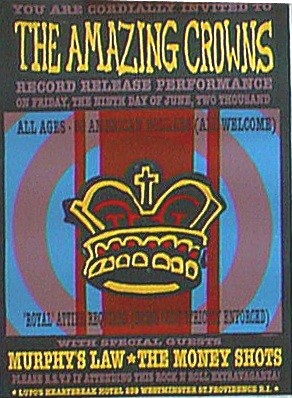
|
WM: Now that you have a 'resume' and you've done a bunch of big bands do you find it easier to get jobs?
PC: That's what I'm still doing now, and what I was trying to do the whole time, get as much work as I could possibly do, and do anything that came along. As long as I you know liked it, I would go for it. Once and a while there's something that I'm you know, like not into it, but if it pays well it might allow me to get the cash to do like six other projects that I really wanted to do then I'd go for it. But it does make it easier now when I'm trying to do a show and I like need to contact somebody. They can at least see that I've got a number of pieces and they take it seriously.
WM: How did you get the Sting poster job?
PC: That was a total accident. That was more the promoters of the show. Really, really big acts like that you can't even get in contact with their record company people, so I'll go through the promoters. Like the Creed show I just did that was the promoters. They had seen some of my work and asked me to do something for them. The band eventually gets some, but if I don't go through the band I go through the promoter.
WM: Are they local promoters? Like don Law?
PC: Yea, but I haven't delt with John Law yet, a lot of the time it's the promoter of the tour, not the venue promoter. A lot of the guys like Don Law they do shows for the Tweeter Center and stuff like that. I haven't taken it to that point yet, but I might someday. A lot of the bands that I like and what I do don't necessarily play there. I do like a lot of indie stuff, which is a lot more fun.
WM: Yeah it always helps if you like the band.
PC: Exactly that's probably one of the most important things for me. You have to like it.
WM: Historically too, I think silkscreen posters aren't something that bigger bands will even do.
PC: No, they don't.
Waitress interrupts for another round.
WM: So did you grow up in Rhode Island?
PC: Yes, Providence, born and raised. Actually, born in East Providence, then Providence.
WM: How old are you? PC: 23 on Sunday.
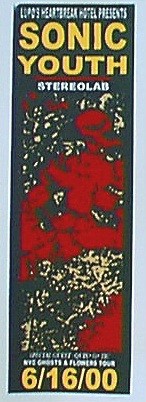 |
WM: That's my sister's birthday. PC: Yea, and that's one of the good things I think. I started out younger. A lot of the guys who are already established are a lot older. So, I'm doing so much now I'm hoping that it will lead to bigger and better things. WM: Yea, our local scene is a little off right now. The Strand is still empty, and Babyhead turned into Hell and there just aren't as many places for things to play. PC: A lot of early posters I was lucky because local guys helped me out. The Double Nothins and The Amazing Crowns and people like that would be opening for somebody and they would help get me the gig to do the poster which was great because I got to do bigger names. I still try to do as much for them as I can. WM: Where do you get the ideas for the poster art? Is it found art, or stuff you sketch? |
PC: I pretty much do a mix of both. As far as inspiration- it's everything, everything around me. Its pure pop, you know tv, radio, whatever I see. Some of it is found and I'll manipulate it or whatever, but most of the time it's drawn.
It will just come to me. I'll have like weeks where I'll have no ideas and I'll be pulling my hair out, and I can't think, but some bands like Nashville Pussy you can just come up with ideas like that (snaps) because you have such great material to work with. But others it gets difficult, sometimes I'll be in block for weeks and they need it in like three days, but it comes, somehow, somewhere.
I have a huge collection of image libraries. Anytime I see something cool in a magazine or whatever I'll just cut it out and every time I need new ideas I'll flip through them and just look at it. I'll see something and think, 'this is a great idea, maybe if I combine it with this and that it will be cool,' you know try to come up with something original.
WM: Do you try to tailor the poster art to the band?
PC: Yea. If its somebody new, or somebody I haven't heard and they're really interested in doing something I'll have them send the music and give it a listed to try to get the vibe of what they're all about and take it from there. But most of the time I know who it is and I know what their music is all about and I just take it from there. Sometimes you get a band like the Melvins, who I love and it is up in the air. You could do anything- as long as its crazy it doesn't matter. WM: Yea, they are definitely different than and Electric Frankenstein, or Nashville Pussy, or even the Crowns. Like your Rev Horton Heat poster with two cupids tattooing each other- that fit with his whole image, and his music.
PC: That's what I thought. That went over really well that poster, they liked it and the Dance Hall Crashers who opened up really liked it. Through that I've kept in contact with them and I'm going to work on their tour for Japan at the end of August. That will be really cool, I'm just going to print up a whole bunch and get them into lots of Japanese clubs and kids hands.
WM: That's cool I really liked the Dance Hall Crashers. They have a new live CD out that is awesome.
PC: That's going to be fun. I'm working with the drummer on that project. Most of the time the band will give you complete artistic control to do whatever. Sometimes I'll have an idea and I'll work with the band. Sometimes if they have a complete idea and I'm only there to regurgitate the job I won't take it. Just because it's not interesting. But for them, the Dance Hall Crashers, I'm working with them because they want to have this whole Japanese robot thing going on, and all sorts of crazy stuff. So I'll draw out a final design for them and send it along.
WM: Have you done any local gallery shows?
PC: I've done a local one over at AS220, and I'll have another one there in a year. I'm also looking to go to the South by Southwest in March.
WM: In Austin?
PC: Yea. I'll set up there with a couple of other guys, and I'm also looking at a couple of different places in New York, Philly, and Chicago. I'll definitely keep you updated.
WM: Have you done any art work for CD's or 7-inch releases?
PC: I've done small random things here and there for friends bands, a while back, then I concentrated so much on the poster art that I stopped. But now its leading back to that, which is another big part of why I do what I do, so I can get into the graphic aspect of the music industry. I'm going to start doing record covers or whatever soon hopefully, that's the next step.
WM: Part of the business of silk-screened posters is that they are usually made in small runs, so unless you can make a lot of money off a few posters you really need to supplement your living. Coop and Kozik can make a living off posters, but they are huge and print many more in their runs than they used to.
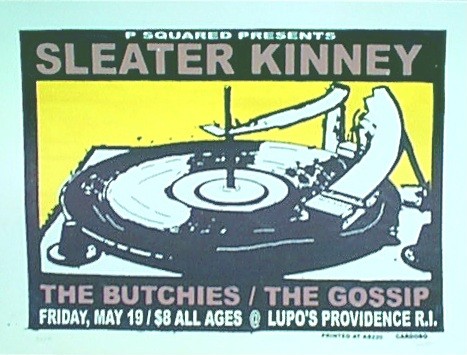 | PC: Guys like Coop and Kozik started out like I did. They did posters for friends and local bands and they started out doing editions of 50 or 100. Now that they've blown up, they don't even have to print for themselves. That's one of the big things that I do different from them. I do everything from the designing, to the layout and printing-I do it myself. |
For them they make enough editions and enough money that they have them printed for them. Kozik and Coop will do the design and layout, but other people will do the printing. And they do editions of 500.
I'm gonna have to do that eventually, because its getting bigger, and I can physically maybe do 250 and I'm exhausted by the end. That's 250 times six colors, and that ends up being hundreds of times that I'm pulling the screens and its killer for one person.
But its starting to get bigger and more and more people want the work, so I'm going to have to figure out something. I'm going to have to get help, which it tough to do if you aren't making tons of cash, but you just have to keep going with it and see what happens. Its only been recent months that its been getting better and better.
WM: Where do you do your work?
PC: AS220, they totally deserve a plug. I do it in a small studio there, which is great. I teach how to screen-print there on Tuesday nights, actually. I start at 6:30pm, and its free. I show anybody there how to start printing their own stuff. Anything from cards to small posters or T-shirts. You just bring your own paper and artwork and we can take it from there.
WM: That's cool, did you teach Mike Hammel from Freakshow? I noticed he's doing their posters and shirts now and they look good?
PC: No I think he taught himself. Its cool, I've seen his work here and there.
WM: What sort of process do you use? Do you use like an acid wash?
PC: Yeah, it's really grass roots. When I started I was in my basement and I had somebody burn screens for me and what not. Then I met this great artist named Mark Cadini who was doing stuff outta the AS220 and he was screening ads and stuff for AS220. He built a studio there. He built a light table and all the equipment needed, and he taught himself. I hooked up with him and we learned together.
We coat the screens and burn them there; we cut the separations and print it all there by hand. Its all water based what we do. It's not toxic. Even the acid wash is really not harmful. It's like an emulsion.
WM: AS220 is cool, but I feel so bad that I've never done anything there. I'm such a slacker, I could develop my stuff there but I'm too lazy to get involved.
PC: Yea, there are all sorts of people who use their equipment, and scan stuff to make it digital. You just have to find the time and get down there and do it.
WM: You are not working a regular job right now are you?
PC: Because of the accident I'm not, which is great. I've been able to do lots of poster work. [Pete was in a car accident and had an operation on his leg. During our interview he was in a cast.] I'm planning on working again after I'm healed.
WM: What was the hardest poster for you to do?
PC: Honestly the hardest ones are the ones that I don't necessarily want to do, but I need to do for the money so I can do another one. Like Creed, I'm not a big fan, but the gig was good because I had a lineup, ya know I had posters to do for the Queers, the New Bomb Turks and I didn't know how I was going to get the cash together. So this promoter in New York City called and he was like, "Do you want to do this poster?" I put it together and it sold and I got to do four posters that I really wanted to do. But it's tough. If you are not into the music, and you are writing a review or your doing a poster its like "grrr," but you do what you have to do to get where you need to go.
I try to be very humble. I'm never an ass hole to any people, if anything I want to keep building bridges, not burning them. So if they have a band and they really want something done for them and they went out of the way to contact me, then I'm going to do something for them. It builds good relations and that's what it's all about.
WM: And it can lead to something down the road.
PC: Exactly.

